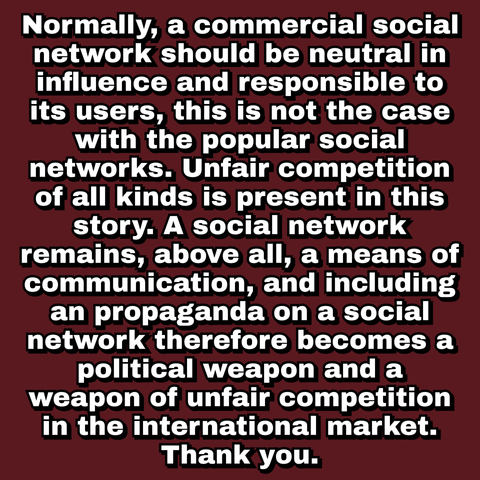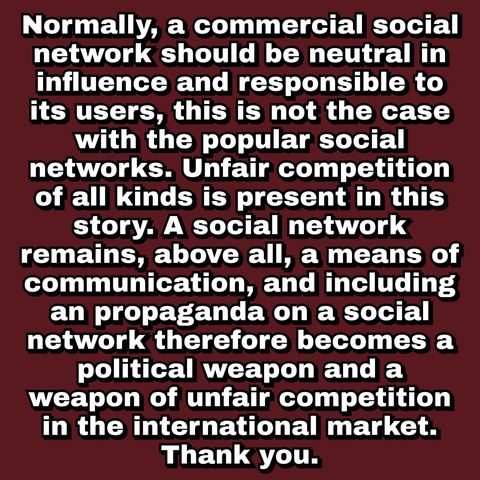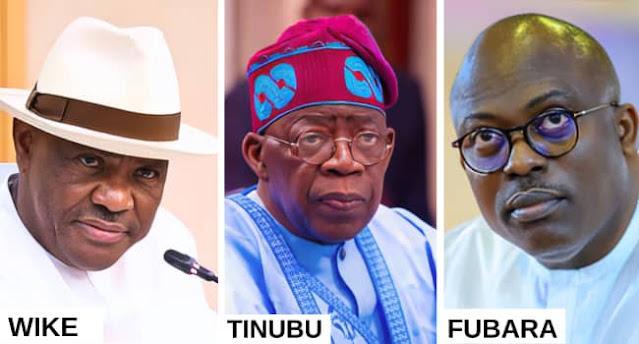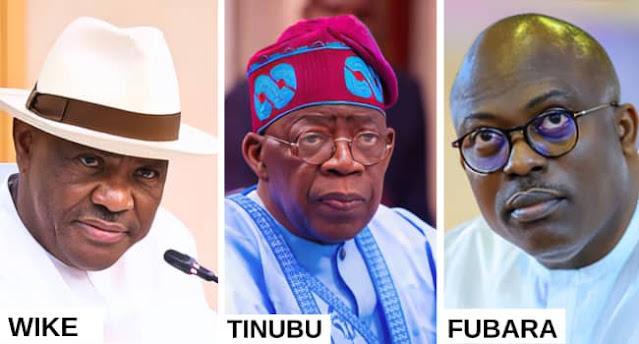Paul Krugman raises urgent questions about rising inequality in America in "Understanding Inequality, Part II." He argues that since 1980, wealth has increasingly concentrated among the top 1%, significantly impacting politics. While globalization and tech changes are often blamed, Krugman highlights a decline in worker power as the primary reason behind these disparities. Discover more about the power dynamics and union importance in his insightful analysis here: https://paulkrugman.substack.com/p/understanding-inequality-part-ii #Inequality #WorkerPower #EconomicFragmentation #PoliticalInfluence #WealthConcentration #Unions #TechFortunes
#PoliticalInfluence
Federal Reserve Chair Jerome Powell firmly denies ever seeking meetings with presidents, emphasizing the central bank's independence from political influence
#YonhapInfomax #JeromePowell #FederalReserve #CentralBankIndependence #MonetaryPolicy #PoliticalInfluence #Economics #FinancialMarkets #Banking #Securities #Bonds #StockMarket
https://en.infomaxai.com/news/articleView.html?idxno=62097
⚠ Normally, a commercial social network should be neutral in influence and responsible to its users, this is not the case with the popular social networks. Unfair competition of all kinds is present in this story. A social network remains, above all, a means of communication, and including an propaganda on a social network therefore becomes a political weapon and a weapon of unfair competition in the international market. Thank you.
#SocialMedia
#CentralizedSocialNetwork
#UnfairCompetition
#Irresponsibility
#Fake
#Politicalinfluence
#NationalistPropaganda
#InternationalMarket
#Dishonesty
#Scams
#Lies
#UnfairCompetitionOfAllKinds
#Justice
#RochAliciaMira
If the Chinese Communist Party (CCP) can't exist, then others trying to bring it down using "authoritarianism is bad" as justification are demonstrating their own form of control, which I see as a form of authoritarianism. The US wants to control world trade, and looking to the US for trade can also be considered authoritarianism.
#GlobalControl #Authoritarianism #USChinaRelations #EconomicPolicies #TradeDynamics #PoliticalNarratives #GlobalEconomy #EconomicFreedom #ConsumerRights #TradeWar #FairTrade #EconomicJustice #MarketDynamics #PoliticalInfluence #GlobalCooperation #RespectForSovereignty #EthicalTrade #EconomicSovereignty #CriticalThinking #PowerBalance
Political meddling backfires! Sooz Kempner discusses Elon Musk's substantial spending to sway voters in Florida and Wisconsin, which ultimately led to disappointing outcomes for Republicans. In Wisconsin, Judge Susan Crawford's Supreme Court win showcases a clear rejection of Musk's influence. Voters' disdain for his involvement reflects a determination against monetary manipulation in politics. Discover the full story and insights [here](https://crooksandliars.com/2025/04/people-hate-you-musk-mercilessly-mocked). #WisconsinPolitics #ElonMusk #Election2025 #PoliticalInfluence
Kudos to Sooz Kempner for this thought-provoking analysis!
Coors lite 🍺= project 2025 Making the connection “Joseph Coors, one of the biggest donors behind Project 2025, continues to shape the conservative agenda with massive contributions. A key player in reshaping federal policies in the post-Trump era. #Project2025 #ConservativeAgenda #PoliticalInfluence
What happens when billionaires clash in pivotal elections? 🌍✨ Explore how Elon Musk and other wealthy figures are influencing a crucial Supreme Court race with national consequences. This video by whatyoumissed dives into the strategies and stakes involved. Discover the broader lessons on power and influence.
#SupremeCourt #ElonMusk #PoliticalInfluence #Elections
Watch now: https://www.youtube.com/watch?v=21CzulUAtQk
ICYMI: RainSMediaRadio News The Choking Grip of Godfatherism in Lagos and Rivers State - Dr. Kenny Odugbemi https://www.rainsmediaradio.com/2025/03/the-choking-grip-of-godfatherism-in.html?utm_source=dlvr.it&utm_medium=mastodon Follow, Like & Share #Godfatherism #NigerianPolitics #Lagos #RiversState #PoliticalInfluence
RainSMediaRadio News The Choking Grip of Godfatherism in Lagos and Rivers State - Dr. Kenny Odugbemi https://www.rainsmediaradio.com/2025/03/the-choking-grip-of-godfatherism-in.html?utm_source=dlvr.it&utm_medium=mastodon Follow, Like & Share #Godfatherism #NigerianPolitics #Lagos #RiversState #PoliticalInfluence
The Ballad Of Kash Patel
(Music Video) Trump’s fixer, bending the system to protect the powerful. This explosive protest song breaks down his role in reshaping justice.
#kashpatel #justicematters #trump #justicematters #politicalinfluence
Elon Musk's journey from tech innovator to political influencer showcases his unparalleled ambition and impact on both industries. 🚀💼
#ElonMusk #TechInnovator #PoliticalInfluence #Tesla #SpaceX #Neuralink #TheBoringCompany #xAI #XCorp #Innovation #Ambition #Controversy #DOGE #GovernmentEfficiency #DigitalAge #Leadership https://medium.com/@eamail43812/elon-musk-a-trailblazer-in-technology-and-politics-fc8ffc16f5ae
Democrats are beyond baffled on how to deal with Trump, Musk and maximalist power simultaneously... they are betting on the courts — or a future maximalist public backlash to maximalism
#TrumpMuskPower #MaximalistGovernment #PoliticalInfluence #GovernmentRestructure #PowerDynamics #Axios
Behind the Curtain: Trump and ...
Bonhoeffer‘s Theory of Stupidity: Understanding MAGA and the stupidity mind virus.
https://youtu.be/ww47bR86wSc?si=FVXy-UwJwFDDwzTA
#Bonhoeffer #psychology
#Theorofstupidity
#StupidityMindVirus #MAGA #PoliticalPsychology #CriticalThinking #SocialDynamics #PowerAndStupidity #MindManipulation #CognitiveBias #MassPsychology #PoliticalInfluence #StupidityVsEvil
#SocialImpact #PhilosophicalThought
Conversation with Rick Rosner on Hollywood Schmollywood
Scott Douglas Jacobsen
In-Sight Publishing, Fort Langley, British Columbia, Canada
Correspondence: Scott Douglas Jacobsen (Email: scott.jacobsen2025@gmail.com)
Received: January 14, 2025
Accepted: N/A
Published: January 15, 2025
Abstract
This interview explores the insights of Rick Rosner, a seasoned television writer and producer, in conversation with Scott Jacobsen. The discussion delves into the evolution of celebrity behavior from the 1970s to the present, highlighting the transition towards more responsible conduct. Jacobsen reflects on the dynamics of fame as a tool for creative endeavors and the balance celebrities maintain between their public personas and private lives. Key topics include the role of charisma and social skills in achieving success, the importance of authenticity and ethical behavior, and the impact of political climates on public figures. The interview also examines the motivations behind celebrity interviews, the public’s fascination with personal relationships and vulnerabilities of celebrities, and the shift towards more mindful and ethical behavior in modern celebrity culture. Additionally, Jacobsen shares personal anecdotes illustrating the influence of charisma and the diverse paths to success within the entertainment industry. This conversation provides a comprehensive understanding of contemporary celebrity dynamics and the factors contributing to sustained public admiration and professional longevity.
Keywords: Authenticity, Charisma, Celebrity Culture, Ethical Behavior, Entertainment Industry, Fame Dynamics, Media Engagement, Political Influence, Public Persona, Public Relations, Social Skills, Success Factors
Introduction
Rick Rosner, a notable television writer and producer with contributions to acclaimed shows such as “Jimmy Kimmel Live!” and “The Man Show,” shares his perspectives on the shifting landscape of celebrity culture in an in-depth interview with Scott Douglas Jacobsen. With a career spanning various unconventional roles and recognized for his high IQ and diverse experiences, Rosner provides valuable insights into how fame is leveraged creatively, the balance between public and private identities, and the evolving expectations placed upon celebrities. This interview, conducted in January 14, 2025 and published on January 15, 2025, captures Rosner’s reflections on the maturation of celebrity behavior, the role of authenticity in public life, and the intricate interplay between personal ethics and professional success in the entertainment industry. The conversation also touches upon the influence of political climates on celebrities’ public stances and the enduring public fascination with the personal lives of public figures. Through personal anecdotes and professional observations, Rosner elucidates the complexities of maintaining relevance and integrity in a highly scrutinized and dynamic media environment.
Main Text (Interview)
Interviewer: Scott Douglas Jacobsen
Interviewee: Rick Rosner
Section 1: Evolution of Celebrity Behavior
Scott Douglas Jacobsen: In 2024, you suggested I start interviewing celebrities or media personalities. Since then, I have received emails with specific hooks pitching these individuals. Did your suggestion and the subsequent publication of my work contribute to this? I am not certain. However, celebrity interviews tend to generate the most excitement. This is demonstrated by the long-standing success of People Magazine, which has been in publication since 1974, surpassing its 50th anniversary. With celebrities, there is a natural advantage—audiences are familiar with them and want to learn more. Since the Trump era, and perhaps even earlier, public life has become increasingly politicized.
Rick Rosner: As a result, celebrities often take public stances that attract significant interest. For instance, Taylor Swift has adeptly shown her political sympathies without overly politicizing her image. Meanwhile, it was recently reported that Carrie Underwood might perform at a politically charged event, which sparked backlash. In a world oversaturated with content, celebrity interviews remain highly engaging.
Section 2: Motivations Behind Celebrity Interviews
Jacobsen: What do celebrities seek from interviews when the focus is not on promoting their next project, in your experience?
Rosner: Celebrities often seek to be understood as multidimensional individuals beyond their professional accomplishments. This perspective is often successful. For example, Pamela Anderson is making a significant comeback with The Last Showgirl. Interviews have highlighted her strong performance and intellectual engagement with acting as a craft, moving beyond her previous image as a star of Baywatch or someone associated with public controversies.
Audiences tend to support celebrities who appear relatable and genuine. On the other hand, they are equally fascinated by celebrities behaving poorly. Recently, Mel Gibson appeared on a podcast promoting Ivermectin as a cancer cure, spreading misinformation. This drew criticism, yet people would likely be equally interested if Gibson changed their perspective and demonstrated a more informed and positive approach.
Section 3: Public Interest in Celebrities
Jacobsen: Why are people so interested in celebrities?
Rosner: One reason is that we already know much of their stories. Another is that we want them to be deserving of our interest. Celebrities have immense resources, agency, and wealth, and we want to see how they use their power.
We cheer for their relationships, even when we expect them to fail. For example, Jennifer Lopez and Ben Affleck recently got back together. This might be their third time as a couple. People want it to work out but are intrigued by its potential to fall apart.
J.Lo is known as a diva but doesn’t seem unkind. Despite some personal struggles, Ben Affleck comes across as intelligent, kind, and fun. People generally want good things for him. He was married to Jennifer Garner, who is widely respected and seems genuinely decent.
When we see celebrities with every advantage face challenges, we question how the rest of us will manage. What does that mean for everyone else if they struggle to make relationships or personal goals work despite their resources?
Section 4: Celebrity Activism and Responsibility
Jacobsen: Which celebrities have impressed you with their commitment to causes outside Hollywood, even after achieving fame?
Rosner: Any celebrity who becomes knowledgeable and active in a cause stands out. Leonardo DiCaprio, for instance, speaks about environmental issues and seems reasonably well-informed. However, he’s criticized for using yachts and private planes, contributing to the pollution he advocates against.
George Clooney also comes to mind. He is knowledgeable and upstanding and has championed causes like protecting the oceans. Additionally, Clooney has actively supported Democratic political candidates and worked to nudge President Biden on policy matters.
When George Clooney exited the race for office, reactions varied. However, he comes from a political family—his father ran for office—so he understands the landscape. He also seems like a genuinely decent person. When he became rich and famous, he gave each of his friends a million dollars, reasoning that if he could enjoy financial relief, why shouldn’t his friends share that comfort?
This generosity reflects someone who values others. My former boss was similarly charitable. I know he’s incredibly informed from years of working with him, particularly on random subjects. He’s highly tech-savvy, always online, and can quickly educate himself on nearly any topic. Many celebrities share these traits—surprisingly knowledgeable and smart, which benefits them in the entertainment industry.
Section 5: Intelligence and Success in Acting
Jacobsen: Do you think intelligence correlates with acting success?
Rosner: To a degree, yes. Successful actors often exhibit intelligence because it enhances their craft. While some may succeed early in their careers due to extraordinary physical attractiveness, sustaining a long-term career often requires intelligence, intuition, or hard work.
Jacobsen: How would you assess their social astuteness and emotional sensitivity?
Rosner: The entertainment industry is full of individuals with exceptional social skills, almost to the point of what could be called “reverse autism.” Many performers have heightened social understanding and intuition, which correlate with success. However, these qualities aren’t mandatory—some succeed without them.
For example, we attended a talk with Jesse Eisenberg, an actor, writer, and director. He wrote and starred in a film about cousins retracing their grandmother’s life during the Holocaust alongside Kieran Culkin. In the movie, his character has OCD, which mirrors Eisenberg’s experiences. He used rubber bands around his wrist, snapping them to stay grounded in the film and real life.
He was candid about the challenges of making that film compared to others in which he was simply a hired actor. It became clear that a creative individual who loves making art, working hard, and focusing on the craft rather than seeking widespread recognition.
Jesse Eisenberg, for example, seems to enjoy making films more than embracing the perks of being a movie star. He mentioned that being a star makes it easier to get projects funded. He can secure financing more effectively by attaching his name to a screenplay. However, he doesn’t seem drawn to stardom’s glamour or hedonistic aspects. For him, fame is a tool to achieve creative goals rather than an indulgence.
Section 6: Charisma and Social Skills in Success
Jacobsen: Do charisma and schmoozing play a significant role in success, or can performers manage without them?
Rosner: It certainly helps, but it’s not essential. George Clooney, for instance, is naturally charming and charismatic, whether he intends to be or not.
I once worked as a doorman at the Sagebrush Cantina. One of my duties was to ensure no one parked in a specific space out front. It looked like a handicapped spot but was reserved for the fire marshal if he needed to check occupancy limits. If we exceeded those limits, the fire marshal could shut us down or start visiting regularly, which would have been bad for business.
One day, a car full of older adults parked in that spot. An older man, probably in his late 70s, got out with his wife, who was walking with a cane. I approached them to explain that they couldn’t park there. My job required me to be firm, even unpleasant, if necessary. However, as the man spoke to me, he exuded a charming, twinkling charisma. He pleaded politely, explaining his wife’s difficulty walking.
Against my better judgment, I let them park there. Afterward, I questioned myself, wondering why I had caved so easily. I couldn’t figure out if the man were deliberately persuasive or if it was just his natural demeanour. Later, I realized it was Lloyd Bridges. His charm was undeniable, whether intentional or not.
Even in his old age, Lloyd Bridges remained a charming and charismatic figure. As the father of Jeff Bridges and a star in his own right, his charisma was undeniable. It’s not a physical force like in physics but a real interpersonal force that can influence people profoundly.
This reminds me of seeing actors like Sam Elliott, who is now likely the same age Lloyd Bridges was when I met him. In his late seventies, Sam Elliott remains a familiar and charismatic figure. If you Google “Sam Elliott and wife,” you’ll see this iconic actor, who has been in movies for over 55 years, married to a petite, older woman. It’s striking because we associate stars with immense social leverage. Yet, many remain in long-term relationships with partners who seem like “regular” people.
Jacobsen: Why do you think that contrast feels unusual?
Rosner: It seems odd because we expect celebrities to maximize their social capital in all aspects of life. However, many have long-term partners who’ve been with them through the highs and lows of their careers. They’re human beings first and love their partners for reasons beyond surface appearances or public perception.
I used to work out at Gold’s Gym in North Hollywood, where I met Albert Beckles, a legendary bodybuilder. Beckles, who might now be in his mid-80s or older, was incredibly fit. Even in his seventies, he maintained a physique with around four percent body fat. Despite his age, he looked youthful, with a shaved head and a ripped body.
Occasionally, I’d see his wife or girlfriend, a petite older white woman, and their pairing seemed unusual at first glance. With his youthful appearance and powerful presence, Beckles contrasted starkly with his partner, who looked her age. However, their relationship likely spanned decades—they probably met when they were younger and grew old together. She naturally aged while he maintained a youthful appearance due to his lifestyle. It highlights how their bond was built on something deeper than appearances.
Section 7: Balancing Public and Private Personas
Jacobsen: Do you think celebrities have an innate duality—a personal identity and a public persona—that helps them succeed?
Rosner: Absolutely. Celebrities who reach the highest levels of fame often balance two distinct identities: their authentic selves and their celebrity personas. The way they manage this dynamic varies greatly. Some embrace their celebrity status fully, using it to fuel their careers. In contrast, others prioritize maintaining their identity and relationships. Success often depends on how well they can navigate these two facets of their lives.
These days, most celebrities manage their public lives well. We’re no longer in the age of “celebrity assholes,” which was more prevalent in the 1970s. For instance, when I was on the writing staff of a major show, the culture wasn’t about excess or indulgence. Instead of doing cocaine, we were taking fibre gummies to deal with the sedentary lifestyle of long hours at our desks.
This era has more celebrities who behave responsibly and navigate fame with maturity. I watched my former boss evolve from being largely a radio personality to one of America’s 100–150 most famous people. Despite this rise in fame, he didn’t lose his decency.
Jacobsen: How did he manage the pressures of fame while staying grounded?
Rosner: He didn’t engage in exploitative behaviour or use his position to harm others. He remained charitable and reasonable, though he enjoyed playful banter and asking awkward questions as part of his natural curiosity. His increased agency and responsibilities came with new challenges—paying for a publicist, manager, and agent and managing media interactions carefully.
However, he became less cautious in expressing his views during the Trump era. As a decent person, he felt compelled to speak out about alarming events in America. For example, he was deeply upset by the 2017 Las Vegas shooting, where over 50 people were killed and more than 500 were injured. As a Las Vegas native, this tragedy hit close to home.
Traditionally, late-night hosts avoided political commentary to maintain a broad audience. But my boss, like others, felt he had to address critical issues, even at the risk of alienating some viewers.
Jacobsen: Do you think this shift reflects a broader change in celebrity culture?
Rosner: Yes. We’re in an era where most celebrities manage their public personas carefully and behave with greater responsibility. Of course, no one is perfect, and every celebrity has moments of controversy. Still, the overall trend is toward more mindful and ethical behaviour.
Celebrities, like anyone else, can occasionally be caught acting poorly. However, we are in an era where they are generally more responsible. This may be because the public is better informed, as a lack of information often leads to poor decisions. In the 1970s, I was certainly immature, as were many celebrities at the time.
Section 8: Success Beyond Social Competence
Jacobsen: What about people in Hollywood who aren’t socially competent? Can they still succeed?
Rosner: Yes, it’s possible. I’m not particularly socially competent, but I managed to build a career. Part of my success was due to a writing partnership with someone who excelled socially—what I’d call “reverse autism.” He handled the social dynamics, which was helpful, even if it wasn’t always easy.
Additionally, you can succeed without social prowess if you’re good at what you do. I worked hard and developed skills that compensated for my shortcomings. For example, I became comfortable admitting personal flaws and turning them into humour, similar to what stand-up comedians do. If my jokes didn’t land, I could still make people laugh by being candid about embarrassing topics.
Many talented individuals in entertainment, some on the spectrum or socially unconventional, succeed because of their competence, creativity, and hard work.
Jacobsen: What about people at the lower levels of entertainment, like production assistants or interns?
Rosner: At the entry-level, I’ve noticed a mix of talent and incompetence. Many interns or PAs I encountered early in my career were hired through connections rather than merit. Some were unreliable or lacked dedication. This often allowed competent and hardworking individuals—even unconventional—to stand out and advance.
Over time, the less capable individuals tend to be weeded out. In the early stages, though, it’s possible to succeed as a “weirdo” if you’re reliable, competent, hardworking, or possess a couple of those qualities.
Jacobsen: What if someone is found to be unethical or fraudulent?
Rosner: I’ve been fortunate to work with mostly ethical people. While dishonesty exists in any industry, I’ve rarely encountered it directly. Ethical behaviour tends to matter more as people advance, where reputations carry greater weight.
Jacobsen: Thank you again for the time, Rick.
Discussion
The interview between Scott Douglas Jacobsen and Rick Rosner offers insightful perspectives on the evolving landscape of celebrity culture. Rosner highlights a significant shift from the reckless behavior of the 1970s to the more responsible and ethically conscious conduct of today’s celebrities. This transformation is attributed to increased public accountability and the pervasive influence of social media, which hold public figures to higher standards.
A central theme is the strategic use of fame as a tool for creative and social endeavors rather than personal indulgence. Rosner emphasizes that successful celebrities balance their public personas with their authentic selves, fostering relatability and long-term admiration. Authenticity and ethical behavior emerge as crucial factors for sustaining public trust and mitigating controversies, aligning with the broader societal demand for integrity in public figures.
The role of charisma and social skills is discussed as beneficial but not essential for success in the entertainment industry. Rosner argues that talent, hard work, and authenticity are equally important, allowing individuals to thrive even without exceptional social prowess. This is exemplified through anecdotes about charismatic figures like Lloyd Bridges and Sam Elliott, illustrating how genuine personal qualities can enhance public appeal.
Celebrity activism is another key topic, with Rosner commending figures like Leonardo DiCaprio and George Clooney for their commitment to environmental and political causes. However, he also notes the scrutiny they face to ensure their actions align with their advocacies, highlighting the complexities of public advocacy.
Overall, the interview underscores the importance of balancing public image with personal integrity, leveraging fame for meaningful purposes, and adapting to the changing expectations of audiences. Rosner’s insights provide a comprehensive understanding of the factors that contribute to sustained success and public admiration in the modern entertainment industry.
Methods
The interview was conducted by Scott Douglas Jacobsen, with Rick Rosner who is known for his work on shows like “Jimmy Kimmel Live!” and “The Man Show.” The methodology employed for this interview was a semi-structured format, allowing for a flexible yet focused conversation that could delve deeply into relevant topics while accommodating spontaneous insights.
Data Availability
No datasets were generated or analyzed during the current article. All interview content remains the intellectual property of the interviewer and interviewee.
References
(No external academic sources were cited for this interview.)
Journal & Article Details
- Publisher: In-Sight Publishing
- Publisher Founding: March 1, 2014
- Web Domain: http://www.in-sightpublishing.com
- Location: Fort Langley, Township of Langley, British Columbia, Canada
- Journal: In-Sight: Interviews
- Journal Founding: August 2, 2012
- Frequency: Four Times Per Year
- Review Status: Non-Peer-Reviewed
- Access: Electronic/Digital & Open Access
- Fees: None (Free)
- Volume Numbering: 13
- Issue Numbering: 2
- Section: A
- Theme Type: Idea
- Theme Premise: “Outliers and Outsiders”
- Theme Part: 33
- Formal Sub-Theme: None
- Individual Publication Date: January 15, 2025
- Issue Publication Date: April 1, 2025
- Author(s): Scott Douglas Jacobsen
- Word Count: 2,353
- Image Credits: Photo by Jeremy Bishop on Unsplash
- ISSN (International Standard Serial Number): 2369-6885
Acknowledgements
The author thanks Rick Rosner for his time and willingness to participate in this interview.
Author Contributions
S.D.J. conceived and conducted the interview, transcribed and edited the conversation, and prepared the manuscript.
Competing Interests
The author declares no competing interests.
License & Copyright
In-Sight Publishing by Scott Douglas Jacobsen is licensed under a Creative Commons Attribution-NonCommercial-NoDerivatives 4.0 International License.
© Scott Douglas Jacobsen and In-Sight Publishing 2012–Present.
Unauthorized use or duplication of material without express permission from Scott Douglas Jacobsen is strictly prohibited. Excerpts and links must use full credit to Scott Douglas Jacobsen and In-Sight Publishing with direction to the original content.
Supplementary Information
Below are various citation formats for Conversation with Rick Rosner on Hollywood Schmollywood.
- American Medical Association (AMA 11th Edition)
Jacobsen S. Conversation with Rick Rosner on Hollywood Schmollywood. January 2025;13(2). http://www.in-sightpublishing.com/schmollywood - American Psychological Association (APA 7th Edition)
Jacobsen, S. (2025, January 15). Conversation with Rick Rosner on Hollywood Schmollywood. In-Sight Publishing. 13(2). - Brazilian National Standards (ABNT)
JACOBSEN, S. Conversation with Rick Rosner on Hollywood Schmollywood. In-Sight: Interviews, Fort Langley, v. 13, n. 2, 2025. - Chicago/Turabian, Author-Date (17th Edition)
Jacobsen, Scott. 2025. “Conversation with Rick Rosner on Hollywood Schmollywood.” In-Sight: Interviews 13 (2). http://www.in-sightpublishing.com/schmollywood. - Chicago/Turabian, Notes & Bibliography (17th Edition)
Jacobsen, S. “Conversation with Rick Rosner on Hollywood Schmollywood.” In-Sight: Interviews 13, no. 2 (January 2025). http://www.in-sightpublishing.com/schmollywood. - Harvard
Jacobsen, S. (2025) ‘Conversation with Rick Rosner on Hollywood Schmollywood’, In-Sight: Interviews, 13(2). http://www.in-sightpublishing.com/schmollywood. - Harvard (Australian)
Jacobsen, S 2025, ‘Conversation with Rick Rosner on Hollywood Schmollywood’, In-Sight: Interviews, vol. 13, no. 2, http://www.in-sightpublishing.com/schmollywood. - Modern Language Association (MLA, 9th Edition)
Jacobsen, Scott. “Conversation with Rick Rosner on Hollywood Schmollywood.” In-Sight: Interviews, vol. 13, no. 2, 2025, http://www.in-sightpublishing.com/schmollywood. - Vancouver/ICMJE
Jacobsen S. Conversation with Rick Rosner on Hollywood Schmollywood [Internet]. 2025 Jan;13(2). Available from: http://www.in-sightpublishing.com/schmollywood
Note on Formatting
This layout follows an adapted Nature research-article structure, tailored for an interview format. Instead of Methods, Results, and Discussion, we present Interview transcripts and a concluding Discussion. This design helps maintain scholarly rigor while accommodating narrative content.
#authenticity #CelebrityCulture #Charisma #EntertainmentIndustry #EthicalBehavior #FameDynamics #MediaEngagement #PoliticalInfluence #PublicPersona #PublicRelations #socialSkills #SuccessFactors
**Likely Meaning of This Statement**
The remark suggests that Russia may have influenced U.S. internal politics by hacking the email servers of both major parties—Democrats and Republicans. However, while compromising materials about the Democrats were leaked, information about the Republicans remained undisclosed.
**Possible Meaning:**
- **Manipulation and Control:** The author implies that this information could have been used by Russia to exert pressure on Republicans, compelling them to support Trump or avoid opposing him.
- **Explaining Trump’s Phenomenon:** It hints that this pressure might explain why a significant portion of Republicans backed Trump’s actions, even when they seemed illogical or against their principles.
- **Conspiracy and Power Shift:** The statement alludes to secret influence that helped "break" the Republican Party, making them more compliant with Trump.
This perspective reflects a politically charged assumption, emphasizing distrust in transparency within power dynamics and external interference.
#RussiaInterference #USPolitics #HackerAttacks #DemocraticParty #RepublicanParty #TrumpSupport #ElectionManipulation #CyberSecurity #PoliticalInfluence #Election2024 #PoliticalTheories #ExternalInterference #EmailLeaks #USElection #TrumpControversy #PoliticalPressure
During Hitler's rise to power, wealthy individuals and industrialists, like those from I.G. Farben and Krupp, provided significant financial support. This backing was crucial for the Nazi Party's ascent, highlighting how financial influence can shape political movements. A stark reminder of history's complexities. #History #WWII #PoliticalInfluence
---
How's that?
Donald Trump has always been for sale.
👉 It used to be shocking how many people were willing to prop him up in the hopes of profiting off his increasingly seamy ventures.
💥But thanks to a morally bankrupt Republican Party and our degraded corporate media, Donald remains alarmingly close to the kind of power that’s worth shelling out massive amounts of money to be close to—and benefit from.
🔥Any person or entity, from Putin to Saudi Arabia’s LIV Golf, willing to throw Donald a few bucks for a licensing fee or a Trump Tower condo has gained access and influence.
Given this decades-long pattern, it’s not surprising that the world’s richest fascist -- South African jumping bean Elon Musk -- would also be interested in purchasing a few shares in a man who is willing to sell whatever he can get his hands on
—whether it’s steaks or American national security
—because he values money more than anything.
🆘 In exchange for Donald’s willingness to throw Musk the keys to the federal government,
Musk is throwing a considerable fortune, as well as the weight of Twitter’s influence, behind the Republican candidate.
For him, it’s a safe bet because he knows, if Donald is elected, he’ll do anything Musk wants him to do.
It is, of course, a devil’s bargain that continues to be made by others, including the aforementioned Vladimir Putin.
The New York Times reported Friday that Musk and Donald speak regularly.
Musk has spent at least $140 million on America PAC, a political action committee that supports Donald.
Donald has told several people that this amount could balloon to as much as $500 million.
According to the Times, Musk, a man with tremendous reach and influence simply by virtue of the fact that he has acquired an obscene amount of wealth, is “all in” with Donald now:
Ensconced in a war room in Pittsburgh with a team of lawyers, public-relations professionals, canvassing experts and longtime friends,
Mr. Musk is trying to apply strategies and entrepreneurial lessons from his businesses to a grind-it-out political mission with just weeks to go until Election Day.
It may be impossible to capture the financial value of all the support Mr. Musk is providing to Mr. Trump.
This is in part because of his role on X, where he amplifies so much of the former president’s message.
As Benjamin Soskis, a historian of the ultrarich, told the Times,⚠️ “I’m not sure there is a precedent in modern history to how Musk has inserted himself into a presidential race.”
#DonaldTrump #ElonMusk #PoliticalInfluence #RepublicanParty #CorporateMedia #Fascism #PoliticalActionCommittee #ElectionDay #WealthAndPower #DevilsBargain
⭕️ആഷിറിന്റെ മരണത്തിൽ ദുരൂഹത: മയക്കുമരുന്ന് മാഫിയയുടെ പങ്കുണ്ടെന്ന് പി.വി. അൻവർ എംഎൽഎ
Read full story: https://nivadaily.com/pv-anvar-alleges-mystery-ashir-death-drug-mafia-involvement/
Join our Whatsapp group
https://chat.whatsapp.com/CktzgxHMaoo84IZtsOqEe6




